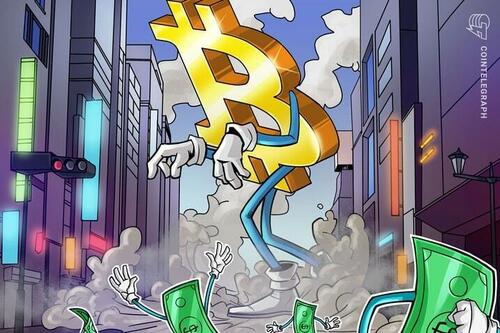Authored by Christopher Tepedino via CoinTelegraph.com,
The US dollar could lose its status as the world’s reserve currency to Bitcoin or other digital assets if the United States does not get its debt under control, according to BlackRock CEO Larry Fink.
Fink wrote in his Annual Chairman’s Letter to Investors that “decentralized finance is an extraordinary innovation” that makes “markets faster, cheaper, and more transparent.”
“To be clear, I’m obviously not anti-digital assets (far from it),” Fink states, but “that same innovation could undermine America’s economic advantage if investors begin seeing Bitcoin as a safer bet than the dollar.”
“The U.S. has benefited from the dollar serving as the world’s reserve currency for decades. But that’s not guaranteed to last forever.
…
If the U.S. doesn’t get its debt under control, if deficits keep ballooning, America risks losing that position to digital assets like Bitcoin.”
According to Trading Economics, the US debt equaled 122.3% of the country’s gross domestic product in 2023. That is a considerably higher percentage than the 105% observed in 2018. Moody’s Ratings retains the US’s AAA credit rating but has downgraded its outlook to negative, indicating a possible future rating downgrade.
The US’s Joint Economic Committee wrote that as of March 5, the country’s gross national debt was $36.2 trillion, growing $1.8 trillion, or roughly $4.9 billion per day, over the past year and $12.8 trillion in the past five years. The Bipartisan Policy Center warned this month that the US could default on its debt as early as July 2025.
Bitcoin has been branded as a safe haven for investors who are looking to avoid the perils of fiat currency, including inflation. Some believe that the end of the debt ceiling suspension could lead to a Bitcoin price boom. Others think, as Fink has stated, that the dangers of the national debt could increase Bitcoin adoption.
In 2025, cryptocurrency has gained prominence as an asset class due to adoption by countries such as the US and companies like Strategy. However, some argue that stablecoins could, in fact, increase the dominance of the US dollar.
Fink: Tokenization is democratization
In the letter, Fink says that “tokenization is democratization” with the technological innovation “enabling instant buying, selling, and transferring without cumbersome paperwork or waiting periods.”
If every asset ends up being tokenized, Fink said, “it will revolutionize investing. Markets wouldn’t need to close. Transactions that currently take days would clear in seconds. And billions of dollars currently immobilized by settlement delays could be reinvested immediately back into the economy, generating more growth.”
What exactly is tokenization?
It’s turning real-world assets – stocks, bonds, real estate – into digital tokens tradable online. Each token certifies your ownership of a specific asset, much like a digital deed. Unlike traditional paper certificates, these tokens live securely on a blockchain, enabling instant buying, selling, and transferring without cumbersome paperwork or waiting periods.
Tokenization democratizes access, shareholder voting, and yield, Fink wrote.
It can democratize access. Tokenization allows for fractional ownership. That means assets could be sliced into infinitely small pieces. This lowers one of the barriers to investing in valuable, previously inaccessible assets like private real estate and private equity.
It can democratize shareholder voting. When you own a stock, you have a right to vote on the company’s shareholder proposals. Tokenization makes that easier because your ownership and voting rights are digitally tracked, allowing you to vote seamlessly and securely from anywhere.
It can democratize yield. Some investments produce much higher returns than others, but only big investors can get into them. One reason? Friction. Legal, operational, bureaucratic. Tokenization strips that away, allowing more people access to potentially higher returns.
According to RWA.xyz, the tokenized real-world assets market amounts to $19.6 billion. There are currently around 93,000 asset holders, with 174 issuers. Industry projections indicate that the market could reach $4 trillion to $30 trillion by 2030.
BlackRock’s own BUIDL real-world tokenized asset fund is currently the largest such fund available for trading, with Tether Gold and Franklin Templeton’s BENJI funds coming in second and third place, respectively.
Loading…


















